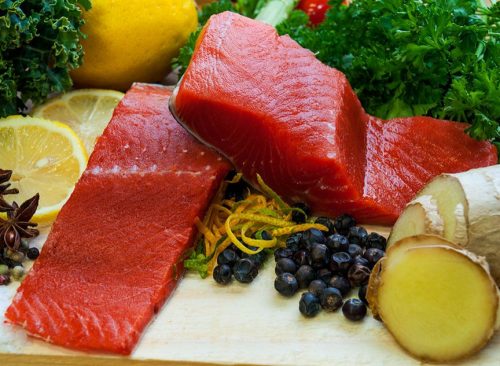15 Foods To Naturally Increase Your Brain Power
Our brain is a complex organic organism that analyzes and addresses thousands of daily activities, memories, stores, vital information, and manages the activities of organs in the body.
Unlike other parts of the body, the brain does not stop working. Even when we sleep, the brain is working hard to consolidate memory. Because of constantly acting, the brain requires a lot of nutrients to function effectively.
The best way to add nutrients to the brain is to eat more foods that are good for it.
But what are the foods that will increase the power of the brain?
If you are looking for these superfoods, take a look at our article below.
We will introduce you to 15 foods from nature with the capacity to strengthen your brain power.
Contents
1. Wild Salmon
60% of the human brain is fat so in order to help the brain works well; it requires important fatty acids to be added regularly. However, these essential fatty acids cannot be made by the body; therefore, they can only be supplied through diet.

Salmon is naturally rich in omega-3, a natural fat in the form of essential fatty acids (EFAs) and docosahexaenoic acid (DHA). DHA contributes to stimulating the development of neurons and brain cells in the brain’s memory part and improving the health of brain cells.
If you are not getting enough DHA and EPAs, you will be more likely to develop memory decline and increase the risk of Alzheimer’s disease or even dementia. With the full supply of DHA and EPAs, you have the ability to control your activity better, and reduce stress and bad mood.
In addition, omega-3 helps prevent inflammation and improves blood flow in the brain. Avoid eating fed salmon because it contains lots of Polychlorinated biphenyl (PCB) and mercury which can have a bad effect on your brain. Wild salmon is the best option.
2. Walnuts
Walnuts are one of the most popular superfoods that boost brain power.
They contain the highest amount of omega-3 fatty acids compared to other nuts. Omega-3 has the effect of protecting your brain as it enhances the activity of neurotransmitters, thereby enhancing cognitive and memory skills.
It is also the only beneficial source of alpha-linolenic acid (ALA). This means that the fruit helps to circulate blood well and allow the distribution of oxygen to the brain effectively.
Walnuts also have very effective anti-inflammatory properties. Besides being an abundant source of omega-3, walnuts is rich in other nutrients to help brain health including vitamin E, fatty acids, copper, manganese, and fiber to support the brain.
Often eating walnuts also helps to improve your cardiovascular health.
3. Blueberries
The flavonoid content of blueberries enhances memory and the brain health thanks to the ability to protect the brain from the effects of harmful free radicals that can damage healthy cells of the brain or even lead to dementia.
Daily consumption of blueberries will help your brain stay alert even when you are older.
The risks of Parkinson’s and Alzheimer’s disease are also minimized with the help of blueberries. Your short-term memory also improves dramatically. On the advice of experts, you should eat 160g blueberries per day.
In addition to the blueberries, you can also consume purple or red fruits which are relative with blueberries because they also contain many beneficial nutrients same as blueberries.
4. Eggs
Egg yolk is an abundant source of choline which is well known to be helpful in promoting fetal brain development in pregnant women.
In addition, egg yolk contains many useful contents such as B vitamins like B6, B12 and folic acid which help reduce the concentration of homocysteine in the blood that is the leading cause of stroke, memory loss, and Alzheimer’s disease.
Lecithin and yellow pigment in egg yolk are beneficial for the development of the nervous system and the body. They enhance brain function, improve memory and prevent dementia in old age.
Research shows that eating eggs in the morning can help you consume less calories in the next 36 hours than usual. This is great for people who are on diet. However, you should not eat too many eggs.
On average, you should only eat one egg per day, or else, you will have some heart problems and get high cholesterol level in your blood.
5. Pumpkin
Folic acid and vitamin B12 in pumpkin will contribute to the development of the brain, preventing nerve damage and brain shrinkage.
Folic acid is especially useful in enhancing the transmission of information through nerve cells and improving memory. We may develop congenital cerebral deformities if deficiency of folic acid.

In addition, pumpkin contains the substance needed for brain activities such as glutamic acid which plays an important role in nourishing the nervous system, supporting the metabolic reactions in nerve and brain cells, eliminating ammonia, promoting the learning capacities and memory of the brain. In 100g of pumpkin can be up to 233mg of glutamic acid.
Therefore, pumpkin is considered as a great brain food supplement for children with mental retardation.
Besides, pumpkin is also rich in tryptophan, a constituent of the protein that nerve cells use to synthesize serotonin (a chemical component that promotes excitement).
So pumpkin is a brain-boosting food, helping to develop the mind, to solve the shortage of natural tryptophan.
6. Broccoli
The high choline content in broccoli helps to connect the neurons in your brain while promoting the growth of new brain cells.
Research has shown that if during pregnancy, women do not get enough choline, the fetus will be at high risk for neurological defects.
Older people should also use a lot of broccoli because it will help to reverse memory loss due to age effectively.
In addition, broccoli is also rich in vitamin K which will be an important factor in improving memory and enhancing cognitive function.
Besides, broccoli is composed of many glucosinolates, which can slow down the breakdown of the neurotransmitter – acetylcholine, which needs for the central nervous system to function properly and keeps our memories sharp.
Low level of acetylcholine is associated with Alzheimer’s disease. It is recommended to consume 3 bowls of broccoli per week. To avoid nutrient depletion, you should steam broccoli instead of boiling it.
7. Dark Chocolate
The caffeine content of dark chocolate will keep you awake throughout the day. In addition, dark chocolate also contains flavonoids, which help boost blood flow to your brain.
A recent study at Wheeling Jesuit University in West Virginia has shown that dark chocolate can improve concentration and retrieval ability.
For older people, dark chocolate enhances blood flow to the brain, which in turn can support short-term memory and prevent memory loss and forgetfulness due to brain aging and decline perception forage.
Dark chocolate also protects the brain from the damage of free radicals. So, to improve brain functions, add a little black chocolate to your diet plan.
8. Turmeric
Researchers from the UCLA Alzheimer’s Research Center have found that adding turmeric to meals can keep your brain alert and increase your ability to receive information.
Turmeric also contains curcumin, which can help reduce the risk of developing Alzheimer’s. In addition, the anti-inflammatory effect of turmeric is also very effective.
You can sprinkle some turmeric powder in warm milk and drink it every day or add fresh turmeric when cooking to boost your brain power.
9. Green Tea
Researchers from the University of Basel have found that green tea can help to increase the electrical connection of the brain, improves cognitive function and prevents dementia.
Green tea can also boost your memory and concentration together with reducing the risk of developing Parkinson’s.

Green tea also contains oxidative sludge that helps reduce the damage of free radicals on your brain cells. Try to drink 2-3 cups of green tea a day to improve your brain power.
10. Tomatoes
Tomato is a superfood that boosts your brain power. One study has shown that lycopene, a powerful antioxidant was found in tomatoes. The lycopene can help the brain fight damage caused by free radical which is the main cause of memory loss and dementia, especially Alzheimer’s disease.
Experts showed that people who consumed lycopene every day would have a much better memory than those who didn’t.
Another compelling reason for us to add tomatoes in your diet is that tomatoes may also reduce the risk of stroke.
You should consume ripe tomatoes with a little olive oil to optimize the absorption of these beneficial substances.
11. Avocado
Good fats in avocados help protect brain cells together with regulating blood, lowering blood pressure, and preventing stroke. When blood circulation works perfectly, oxygen levels reach the brain enough, you will gain good concentration and mental capacity.
As one of the few types of cholesterol-free fruit, which contains monounsaturated fat, avocado can also help lower cholesterol in blood.
12. Extra Virgin Olive Oil
Extra Virgin Olive Oil is truly a nutritious food for the brain. It contains a rich source of a brain protective antioxidant called polyphenols, so adding extra extra virgin olive oil to your diet not only improves memory and learning capacities, but also reverses changes due to age and disease.
This oil also helps fight Amyloid beta-Derived Diffusible Ligand (ADDLS), a protein that is toxic to the brain and causes Alzheimer’s disease.
13. Pumpkin Seeds
Being a rich source of zinc compared to many other seeds, pumpkin seeds provide this precious mineral for enhancing memory and thinking skills.
These seeds are also full of magnesium, B vitamins- the nutrients that are very beneficial to your brain. They play an important role in improving overall brain function.
14. Spinach
Spinach is rich in potassium, which helps maintain the electrical conductivity of the brain, improves thinking and ability to recover.
This kind of vegetable is also rich in antioxidants that protect brain cells from any type of damage and contains essential nutrients such as magnesium, folate, vitamin E, and vitamin K to reduce the risk of developing dementia.
15. Sugar beets
Recent research shows the promising potential of sugar beet to address the incidence of dementia in general and Alzheimer’s disease in particular.
The nitrate content of sugar beet is a secret weapon to protect our brains as it improves blood flow in the elderly, especially in the frontal lobes area of the brain – where associated with degeneration and may cause memory loss in the future.
Natural nitrates in sugar beets enhance blood circulation to the brain and support neurological problems. In addition, it also helps reduce inflammation and is rich in antioxidants that protect the body from cancer and help eliminate toxins in the blood.
These are 15 superfoods to increase your brain naturally. Consider adding them to your daily diet in a sensible way to strengthen your brain. All contents provided are for informational and educational purposes.
We recommend you consult a healthcare professional to determine which method is appropriate for you.
Author bio:
This guest post is by Emily Pham, a blogger with many years of experience in searching the best natural home remedies for beauty and health issues.
Hi,
That’s a very great post.
The Article is Awesome to read. I have been reading your articles and they are really very helpful for me. Thanks for sharing with us your Post. Very good information.